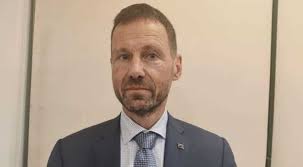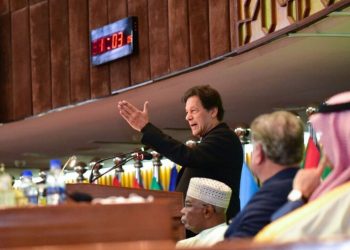Tomas Niklasson thanks Pakistan, OIC for organising extraordinary meeting on Afghanistan

Islamabad: EU Special Envoy for Afghanistan Tomas Niklasson has thanked Pakistan and the Organisation of Islamic Cooperation for organising the OIC extraordinary meeting on Afghanistan.
“I would like to thank Pakistan and the OIC for organising this important and timely meeting and for inviting the European Union to attend as a special guest. We have been reminded today about the grave humanitarian, economic and social crises that loom over Afghanistan,”| he said at the 17th Extraordinary Session of the OIC Council of Ministers on 19 December.
He added: “Like all countries represented here, the EU does not recognise the Taliban appointed interim government. But we remain committed to supporting the Afghan people as we have been doing for several decades. Our commitment goes beyond words and is reflected in concrete action and financial support by European taxpayers.”

Already in September in Geneva, we pledged €300 M in humanitarian assistance for Afghanistan. Thanks also to generous pledges by EU Member States, the EU stands behind more than 70% of the humanitarian assistance being provided. And we welcome the generous support by neighbouring countries and others, including OIC members.
“We have European humanitarian staff present on the ground in Afghanistan working day and night to ensure that our aid reaches Afghans in need through the UN, the Red Crescent and other humanitarian partners. We also stand ready to help to ensure basic services such as education, health and livelihoods (€250M) including teachers’ salaries in provinces where girls go to school. We refer to this as humanitarian+, and we are exploring how salary incentives to teachers can be delivered outside the government system through the UN,” he said.
The envoy said: “We also welcome and support efforts being made to repurpose funds in the World Bank Afghanistan Reconstruction Trust Fund, to address the liquidity shortage and to facilitate bank transfers into Afghanistan.”
Tomas Niklasson: “While we recognise the need for development assistance to Afghanistan, for such assistance to materialise it will require tangible and consistent action by the interim government in terms of its commitments to its people, to the international community and to international law. We are engaged in direct dialogue in Doha with the interim government around five EU benchmarks, which closely relate to the UNSC Resolution 2593 of 30 August, to which we are all bound.”
This includes humanitarian access and safe passage for Afghans who wish to leave Afghanistan. In both areas, we see good progress. “We also underline the importance of an inclusive and representative government in terms of ethnicity, political affiliation, faith and gender. This will require processes that allow the Afghan people, men and women, to have a voice. A voice for domestic recognition,” he said.
Like others today, we also seek commitment from the interim government with respect to Human Rights, notably the rights of women, children and minorities, and we see some positive steps being taken.
And, finally, Afghanistan must never again become a threat to its neighbours or other countries, or a safe haven for terrorist organisations. “We are strongly committed to continue our dialogue based on mutual respect,” he said.
And, he said, “we hope that the interim government will be ready to demonstrate through concrete action its full commitment in all these areas. Such action, I believe, would gradually help to build trust. And may allow partners of Afghanistan to extend their engagement and their assistance even further to move beyond humanitarian and humanitarian+ assistance.”





